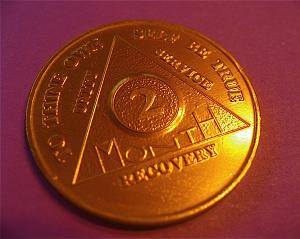On Willpower
 | | Porn |
Over the weekend, my grandmother brought donuts home from the grocery store. It may not sound like an Earth-shattering event—or even an uncommon one—but there’s more to the story. Due to financial difficulties, my family and I have been living with both my parents and grandparents, which means that there are a total of four generations (if you can call an eight-month-old a generation) living under the same roof. The donuts are an example of an on-going generational battle that has come to define this situation, and I promise I’ll explain that shortly.
But first, some more background. My mother has spent decades fighting obesity and overeating, and it has not been a pretty battle. I—not being obese but certainly overweight—was diagnosed with diabetes a few years ago, a condition I share with both her and my grandfather. My wife is still trying to lose the weight she put on during her pregnancy last year, and she has a problem (to put it mildly) with donuts; when it comes to the deliciously evil fried pastries covered in sugar, she is a bonafide addict, and I do not mean that in an exaggerated or facetious manner.
Therefore, bringing donuts into our house is like bringing a vial of crack into a rehab clinic. For three of us (myself included), donuts are a rough equivalent to poison and could, if eaten all at once, put any of the three of us into a coma. For my wife, donuts are the one thing she craves above all else, and putting them in front of her and asking her to resist eating them is ludicrous and cruel. My son, being less than a year old, certainly can’t eat the donuts himself, and my father has been undergoing mouth surgery, a colonoscopy, and other unpleasantries that pretty much exclude him as well. This means that the only person in the whole house who can eat donuts is my grandmother, and guess what, she’s not actually interested in them. In fact, her only defense for the purchase—a defense she brings forth with the utmost sincerity as though the logic of it were infallible—is that they were on sale.
 | | I'm sure there won't be a problem here |
I’m not trying to be mean to my grandmother. God knows I love her, but this incident—which will either end with the donuts being thrown away (the disposal of food is high on my grandmother’s list of unforgivable sins, I should point out) or with my wife bloated, depressed, and coated in a thin dusting of powdered sugar—is a perfect example of how the misconception of willpower can get us into trouble.
You see, my grandmother, along with many people of her generation, believe that, if you have enough willpower, you should be able to resist any temptation whatsoever. An addict need only find enough willpower and he or she will immediately become clean and free of temptation; anybody who says otherwise is just weak or lacking in faith. If you can’t quit smoking, drinking, eating, or whatever, it is only because you lack the willpower to stop. This is a popular and widespread view; it is not only extremely Judeo-Christian, but it is also the main teaching of A.A. and all the other anonymous support groups that use the famous 12 steps.
Unfortunately, science has shown us something altogether different. A recent study published in the journal Psychological Science found that the very idea of willpower can be poisonous to self-control. In the study, subjects who believed they had strong willpower were more likely to give in to temptation (and more quickly) than people who had a more pessimistic view of their willpower. According to lead researcher Loran Nordgren, PhD, the best way to control an addiction like smoking or over-eating is “to avoid any situation where vices and other weaknesses thrive and, most importantly, [to] keep a humble view of [one’s] willpower.”
 | | God bless America! |
Indeed, this rings true to me. I successfully quit smoking three years ago, but it was hardly my first attempt to do so. Earlier in my life, I was still surrounded by friends and coworkers who smoked (I even sung in a smoke-filled bar at one point), so it was nearly impossible for me to resist the urge to light up. Three years ago, however, I was no longer surrounded by a daily dose of cigarettes, and it wasn’t as difficult to quit smoking as it had been before.
Come to think of it, this is probably why our country is largely (pun intended) a country of impulsive overweight jerks. We are taught about willpower at a young age, and assume we can build it. Then, surrounded by fast food and decadent lifestyles, we wonder why we can’t seem to resist the urge to eat a deluxe super-sized three-quarter pound bacon cheeseburger with extra mayo and an extra-extra-large side of fries, or to screw over a few mailroom clerks so that we can use our company trust account to pay for a string of expensive prostitutes and cocaine parties. When we see the damage our behavior does, we do all kinds of things like hypnotherapy and self-help books to improve our willpower, but to no avail.
The problem is that, as far as actual science is concerned, “willpower” is a vague, elusive, and possibly even nonsensical concept. In behavioral psychology, for example, willpower (usually termed “self-control”) is considered the competition between two conditioned responses. You are conditioned by physiology and predisposition to smoke, but you are also conditioned by society and your health to quit smoking. In the case of the unwelcome donuts, you are conditioned by how delicious they taste, but also by how fat and depressed they make you. In either scenario, it isn’t so much how strong your willpower is as much as it is how strong your physical and psychological reward will be.
 | | Nope, nothing cult-like going on here |
12 step programs like A.A. attempt to brainwash you, in a sense, in that they try to strengthen the psychological reward for abstinence. You lean on a support group and a sponsor so that they can reward you for staying clean and provide real punishment for failure in the form of disappointed sighs and reset milestone chips. While this may be a successful strategy (anonymous groups aren’t known for releasing statistics), 12 step programs layer on so much pop psychobabble and bordering-on-religious pseudoscience that any benefit comes at the price of one’s own sanity. This is why addicts who come home clean after doing all the steps in rehab often act like total douchebags and know-it-alls, shortly before relapsing.
This is not to say that one has to have a hopeless take on addiction. While poor willpower (“impulse control” in non-behaviorist circles) can result in all manner of disorders and dysfunctions, there are plenty of successful therapies out there to help one overcome it. However, the best way to control an addiction has more to do with avoiding temptation and having a realistic sense of one’s own lack of willpower than with any drug, program, or therapy session. Indeed, one of the good things about the 12 steps is that the first step is to acknowledge that you are helpless over your addiction. We all should probably acknowledge our helplessness if we want to have better control over ourselves and our impulses, because paradoxically, we have better self-control when we believe we have little.
This is why my grandmother bringing donuts home from the grocery store is such a scandal. She’s old-school—nothing will change that—and in her mind, exposing us all to temptation is a good thing. Unfortunately, as the results will clearly show, it is anything but.
-e. magill 09/08/2009
|
|